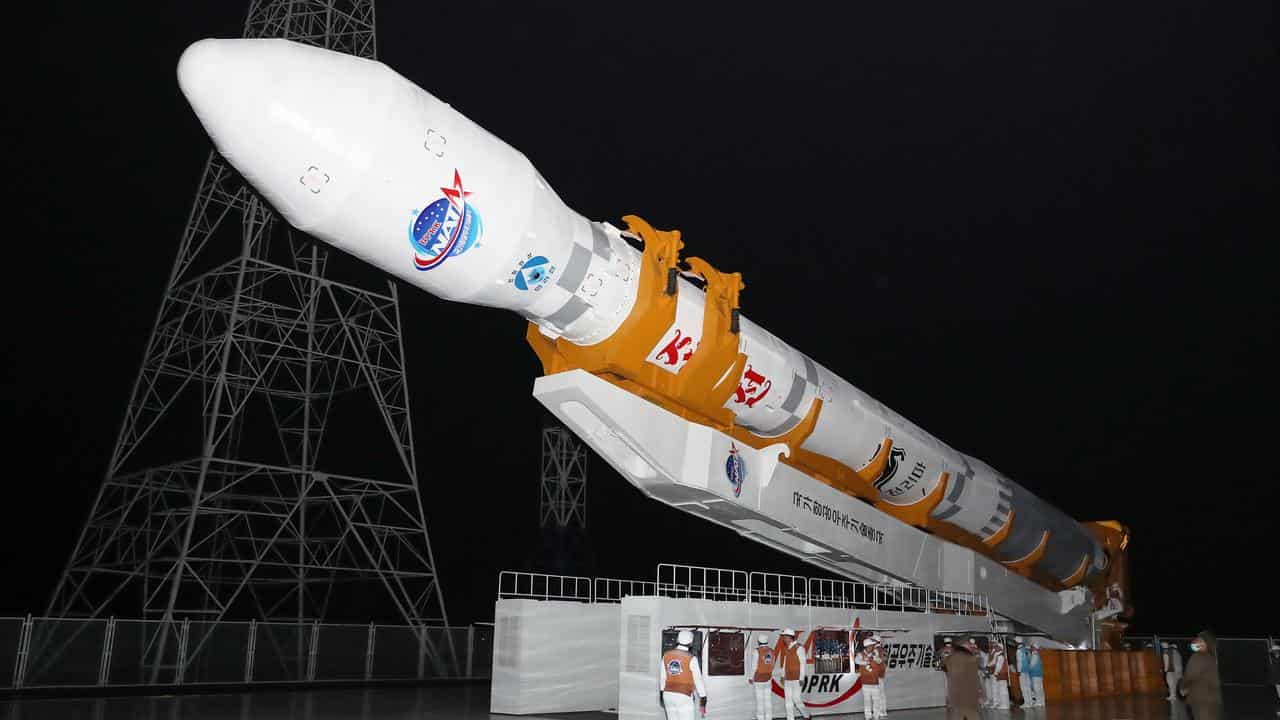
South Korea is suspending part of a military agreement it signed with Pyongyang after the isolated North defied warnings from Washington and its allies and launched a spy satellite, calling it a success.
The suspension of a clause in the agreement will allow South Korea to step up military surveillance along the border.
North Korea said it placed its first spy satellite in orbit on Tuesday.
Photographs published by North Korean state news agency KCNA showed what appeared to be leader Kim Jong-un watching the launch of a rocket from a base.
Kim was later briefed on the satellite's initial operations at the control centre of the space agency in Pyongyang and viewed images taken above Guam of key US military installations, KCNA said.
Kim stressed the need to launch more reconnaissance satellites to give his armed forces "abundant valuable real-time information about the enemy and further promote their responsive posture", it said.
The satellite would begin its formal reconnaissance mission on December 1, after adjustments, KCNA said.
South Korea and Japan could not immediately verify whether a satellite was in orbit.
The Pentagon said the US military was still assessing whether the launch was a success.
South Korean President Yoon Suk-yeol, in Britain for a state visit, approved the decision to suspend part of the inter-Korean agreement.
Yoon earlier led a National Security Council meeting with ministers and the intelligence chief by video link.
The pact, known as the Comprehensive Military Agreement and aimed at de-escalating tensions, was signed at a 2018 summit between former South Korean president Moon Jae-in and Kim Jong-un.

South Korea said it was suspending a clause in the agreement and resuming aerial surveillance near the border on Wednesday.
On Wednesday, the US nuclear-powered submarine USS Santa Fe docked at a South Korean port, a day after the Carl Vinson aircraft carrier arrived in a show of force against North Korea's nuclear and missile programs.
Visiting the carrier, South Korea's Defence Minister Shin Won-sik said joint maritime drills with the United States and Japan were planned to show their "strong will" to respond to any provocation by the North, his office said.
US National Security Council spokeswoman Adrienne Watson called the satellite launch "a brazen violation of multiple UN Security Council resolutions".
United Nations Secretary-General Antonio Guterres urged North Korea to fully comply with UN resolutions, which bar its use of technology applicable to ballistic missile programs.
The foreign ministry of China, Pyongyang's closest ally, called on all parties to ensure peace and stability on the Korean Peninsula.
KCNA said the Malligyong-1 satellite was launched on a Chollima-1 rocket from the Sohae satellite launch facility at 10.42pm on Tuesday and entered orbit 12 minutes later.
North Korea had notified Japan it planned to launch a satellite between Wednesday and December 1, after two failed attempts to launch what it called spy satellites this year.
South Korea's military said it believed the latest rocket carried a reconnaissance satellite.
Tuesday's launch is the first since Kim Jong Un met Vladimir Putin at Russia's modern space facility in September, where the Russian president promised to help Pyongyang build satellites.
South Korean officials have said the latest launch most likely involved technical assistance from Moscow under a growing partnership that has seen North Korea send millions of artillery shells to Russia.
Some missile experts, however, said it was too soon for Russian technical assistance to have been fully incorporated into the satellite or the rocket and that Moscow would not have shared highly sensitive and proprietary technology.









